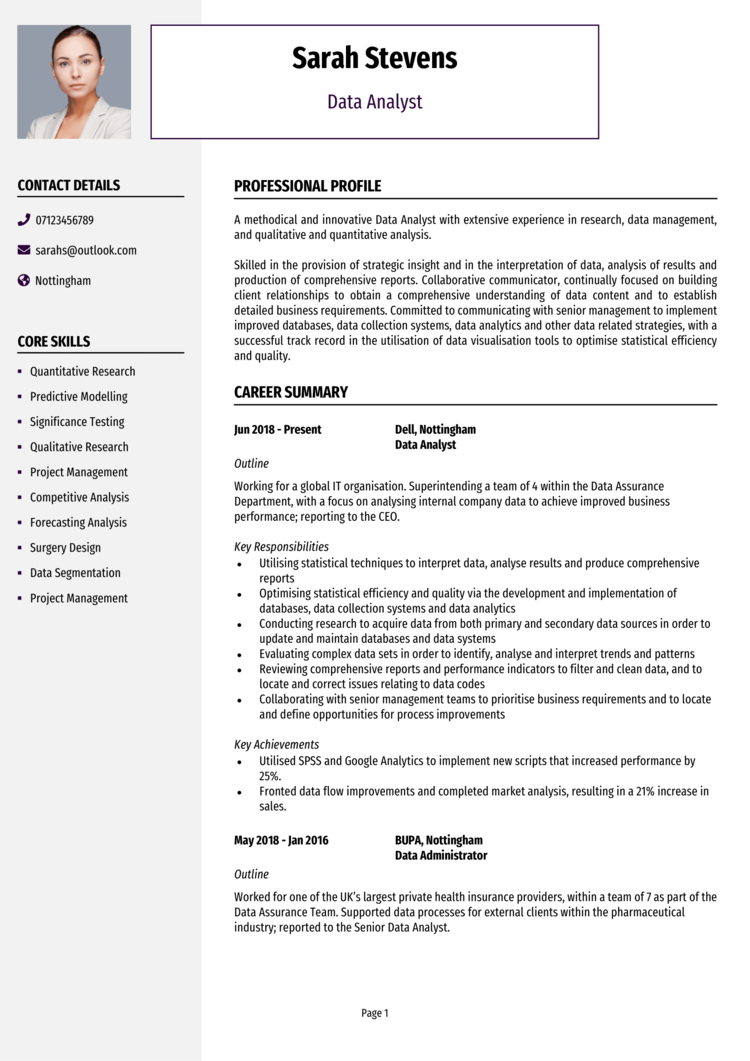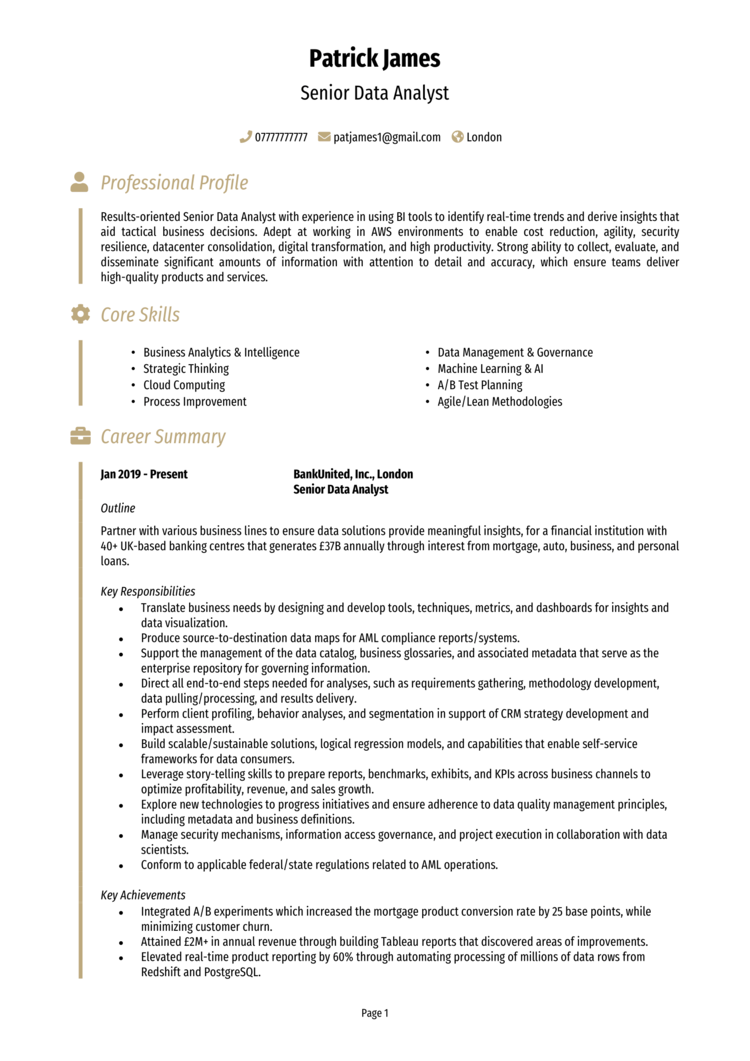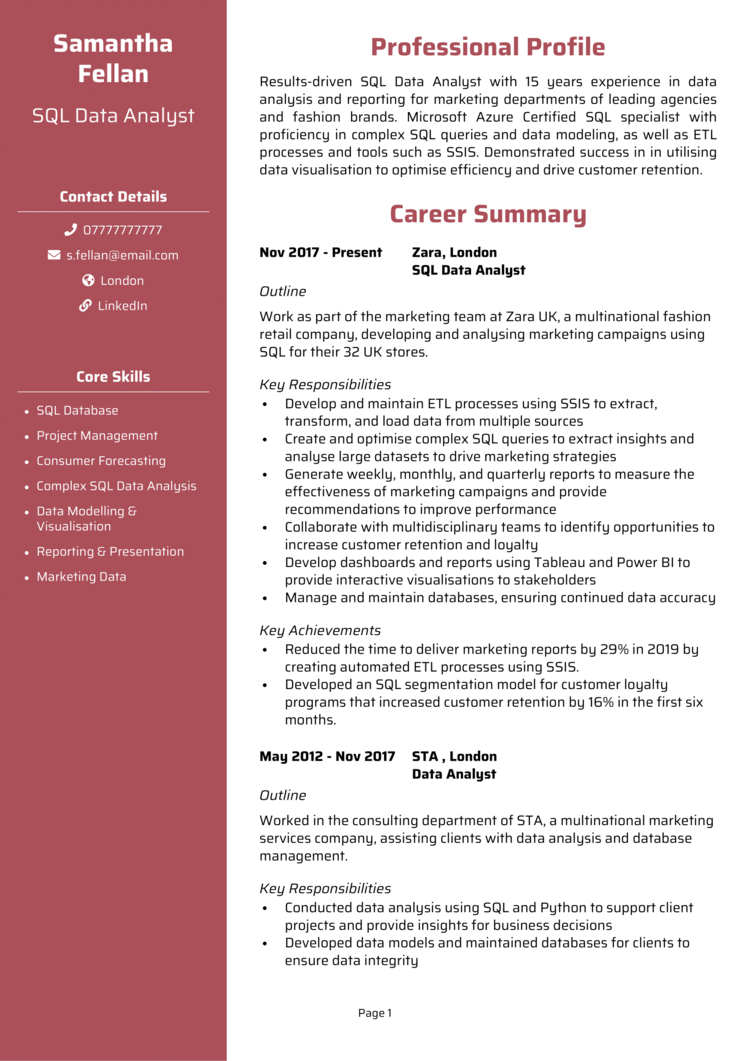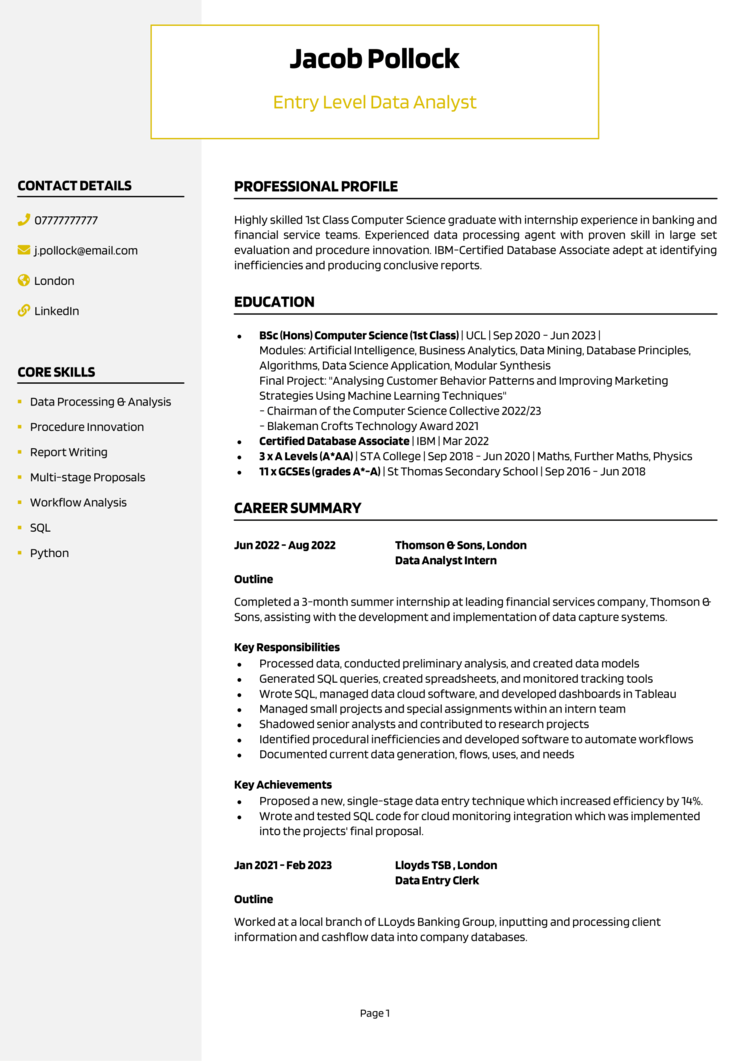Data Analysts transform complex data into actionable insights that people can rely on. Crafting a great CV follows the same principle – distilling your skills and experience into a document that’s clear and impactful.
If you don’t present yourself in the best possible way, recruiters will overlook even the most skilled data analysts.
With this guide – and some helpful Data Analyst CV examples – you’ll learn how to present your experience and expertise in a way that gets recruiters’ attention.
Data Analyst CV

Senior Data Analyst CV

SQL Data Analyst CV

Entry Level Data Analyst CV

How to write your Data Analyst CV
Learn how to create your own interview-winning Data Analyst CV with this simple step-by-step guide.
This guide will walk you through creating a standout Data Analyst CV, from organising its structure and format to the best way of showcasing your technical expertise and professional achievements. By the time you’re done reading, you’ll write a CV that highlights your ability to deliver for companies.
What’s the correct structure for your Data Analyst CV?


Let’s put it this way: a well-structured CV is like a clean dataset. It’s way easier to process and it gets straight to the point. A clear, logical layout that’s nice and easy to navigate will help recruiters quickly understand why you’re the right person for the role.
Here’s how to structure your CV:
- Name and contact details – Position these at the very top so it’s extra easy for the recruiter to offer you the interview.
- CV profile – Begin with a concise summary of your expertise and professional accomplishments.
- Core skills – List your standout abilities, like data visualisation and SQL proficiency.
- Work experience – Detail your previous roles in reverse chronological order.
- Education – Include your academic qualifications and any certifications in data analytics or any related fields.
- Additional info – Optionally, you could mention personal projects or hobbies that show your genuine interest in the role.
Data Analyst CV format


First impressions count: a polished format ensures that your CV reflects your own professionalism.
Recruiters are looking for information they can quickly digest, so keep it clean and reader-friendly. They’ve just sifted through a hundred applicants – make your one a more pleasant read than the competition.
Always stick to these formatting principles:
- Bullet points – Break information into manageable chunks for easy skimming.
- Divide sections – Use clear headings to make navigation less of a hassle for a busy recruiter.
- Use an appropriate font – Prioritise your CV’s readability with clean, professional font and readable design choices.
- No more than 2 pages – This gives you plenty of space to share your story (without making it a novel…)
Data Analyst CV profile


Your profile is your CV’s headline – a brief overview that hooks the recruiter and sets the stage for your experience and skills. For a Data Analyst, this section should emphasise your technical expertise and ability to solve data-related problems.
Data Analyst CV profile examples
Profile 1
Experienced Data Analyst with five years in the e-commerce industry, leveraging data to drive customer acquisition strategies and improve operational efficiency. Proficient in SQL, Python, and Tableau for extracting, analysing, and visualising data to support decision-making.
Profile 2
Dedicated Data Analyst with three years of experience in financial services, specialising in trend analysis and predictive modelling. Skilled in using Excel, Power BI, and R to create actionable insights for risk management and business growth.
Profile 3
Skilled Data Analyst with over eight years in healthcare analytics, focusing on patient data management and reporting. Adept at designing ETL processes, creating dashboards, and ensuring data integrity using tools like SQL Server, SAS, and Tableau.
What to include in your Data Analyst CV profile
What’s the key to a winning professional profile? Relevance. Tailor your profile to reflect the job description, ensuring it aligns with the role’s requirements as conveniently stated in the job advert you’re replying to. Those are, after all, the things a company wants.
Here’s the things your profile should include:
- Where you worked – Mention industries or companies whose data you’ve worked with, such as finance, healthcare, or e-commerce.
- Your top qualifications – Include any degrees, certifications, and any relevant training.
- Technical expertise – Note the skills like SQL or Power BI which you know will come in handy for a data analytics role.
- People you’ve worked with – Say which departments or teams you supported with your data analysis.
- Types of data you’ve worked with – Specify whether you’re trained to handle customer data, or financial figures, and so on.
- Methodologies you know – Highlight analytic techniques like predictive modeling, regression analysis, or clustering algorithms to show depth in data handling.
- Relevant tools you’ve used – Make sure you tailor these to reflect your familiarity with the industry relevant to the role!
Core skills section


The core skills section is a snapshot of your technical toolkit. In a column or two, you want them to give a recruiter an immediate sense of what you’re going to bring to the table once you’re hired.
This section is super flexible, and you can change or add core skills depending on what role you’re looking at.
Avoid the mistake of broad phrases that might apply to any job: instead of saying you “know Excel,” say you’ve built pivot tables and automated reports – it’ll really prove that you know your stuff.
Want a data analyst CV that’s as precise as your reports?
Try our CV builder: it gives you structured templates, pre-written industry content, and expert tips to help you present your skills with clarity and confidence.
What are the most important skills for your Data Analyst CV?
- Data Visualisation – Building engaging and interactive dashboards in Tableau, Power BI, or Excel.
- SQL Querying – Writing complex queries to extract and manipulate data from relational databases.
- Python for Data Analysis – Using libraries like Pandas, NumPy, and Matplotlib for in-depth data exploration.
- Predictive Modelling – Developing forecasting models using statistical techniques and machine learning.
- Data Cleaning – Ensuring data integrity through meticulous cleansing and preprocessing.
- Database Management – Designing and maintaining data storage systems for efficient access.
- KPI Reporting – Creating clear, actionable reports to track and measure business performance.
- ETL Processes – Extracting, transforming, and loading data for seamless integration into analysis workflows.
- Market Research Analysis – Interpreting market trends and customer data to support strategic decisions.
Writing about your work experience


Just like data analysis, employers will want you to apply your analytic skills to the real-world: so proven experience in a professional environment is key.
List your roles in reverse chronological order, focusing on how your contributions added value to your previous employers. Bullet points will make your accomplishments easier to digest. And if you’re newer to the field, highlight relevant academic projects or internships, along with any freelance work you might’ve done.
Structuring your jobs

- Outline – Share the type of company and its name, your role within it, and the context of your work – what did you do there?
- Responsibilities – Highlight key tasks you performed and how doing them brought value to the organisation.
- Achievements – Showcase measurable outcomes, focusing on the results you delivered or improvements you made. Lucky for you, data and figures make this section look really impressive.
Example jobs for Data Analyst
Data Analyst | Shopify
Outline
Analysed large datasets to identify trends and support strategic decisions for an e-commerce company. Delivered data-driven insights to improve marketing campaigns and optimise inventory management.
Responsibilities
- Extracted, cleaned, and analysed data from multiple sources using SQL and Python.
- Created interactive dashboards in Tableau to track KPIs and highlight opportunities.
- Conducted A/B testing to evaluate the performance of marketing campaigns.
- Collaborated with cross-functional teams to provide insights for product launches.
- Monitored data quality and implemented procedures to address discrepancies.
Achievements
- Increased customer retention by 18% through targeted recommendations based on analysis.
- Optimised inventory levels, reducing stockouts by 25% across key product lines.
- Developed a reporting tool that cut analysis time by 30%.
Assistant Data Analyst | General Mills
Outline
Supported data-driven decision-making for a financial services firm, focusing on risk management and portfolio optimisation. Provided insights to help reduce losses and maximise profitability.
Responsibilities
- Compiled and analysed financial data using Excel and R to assess risks and trends.
- Developed predictive models to identify potential default risks among clients.
- Created Power BI dashboards to visualise portfolio performance for stakeholders.
- Conducted monthly reviews of key metrics, presenting findings to senior management.
- Ensured compliance with regulatory reporting standards by preparing accurate reports.
Achievements
- Reduced default rates by 12% through improved risk analysis models.
- Shortened reporting cycles by 20% with automated data aggregation workflows.
- Identified opportunities for cost savings, leading to a £50,000 annual reduction in expenses.
Senior Data Manager | STA Enterprises
Outline
Delivered insights for a healthcare provider by analysing patient data and operational metrics. Focused on improving patient outcomes and streamlining processes.
Responsibilities
- Extracted and managed patient data from SQL databases for reporting purposes.
- Created Tableau dashboards to track hospital performance and patient care metrics.
- Performed statistical analyses to identify trends and areas for operational improvement.
- Collaborated with clinicians and administrators to design data-driven solutions.
- Ensured data accuracy by implementing rigorous validation and quality control processes.
Achievements
- Improved patient discharge times by 15% through operational efficiency analysis.
- Developed a dashboard that reduced report preparation time by 40%.
- Contributed to a reduction in readmission rates by identifying key risk factors.
Writing your education section


The education section is where you show the foundation of your analytical skills. List your degrees, certifications, and relevant training – they’ll all help prove that you’re serious about this role in particular.
New to the field? Go into more depth about any coursework or academic projects that hopefully demonstrate your expertise. Experienced? Keep it brief – recruiters prefer experience anyway.
As always, put the qualifications you earned most recently towards the top, and your GCSEs at the bottom.
Best qualifications for Data Analysts
- Bachelor’s Degree in Data Science, Mathematics, or Statistics, or a similar field
- Google Data Analytics Professional Certificate
- Tableau Desktop Specialist
- Microsoft Certified: Power BI Data Analyst Associate
- SAS Base Programming Credentials





